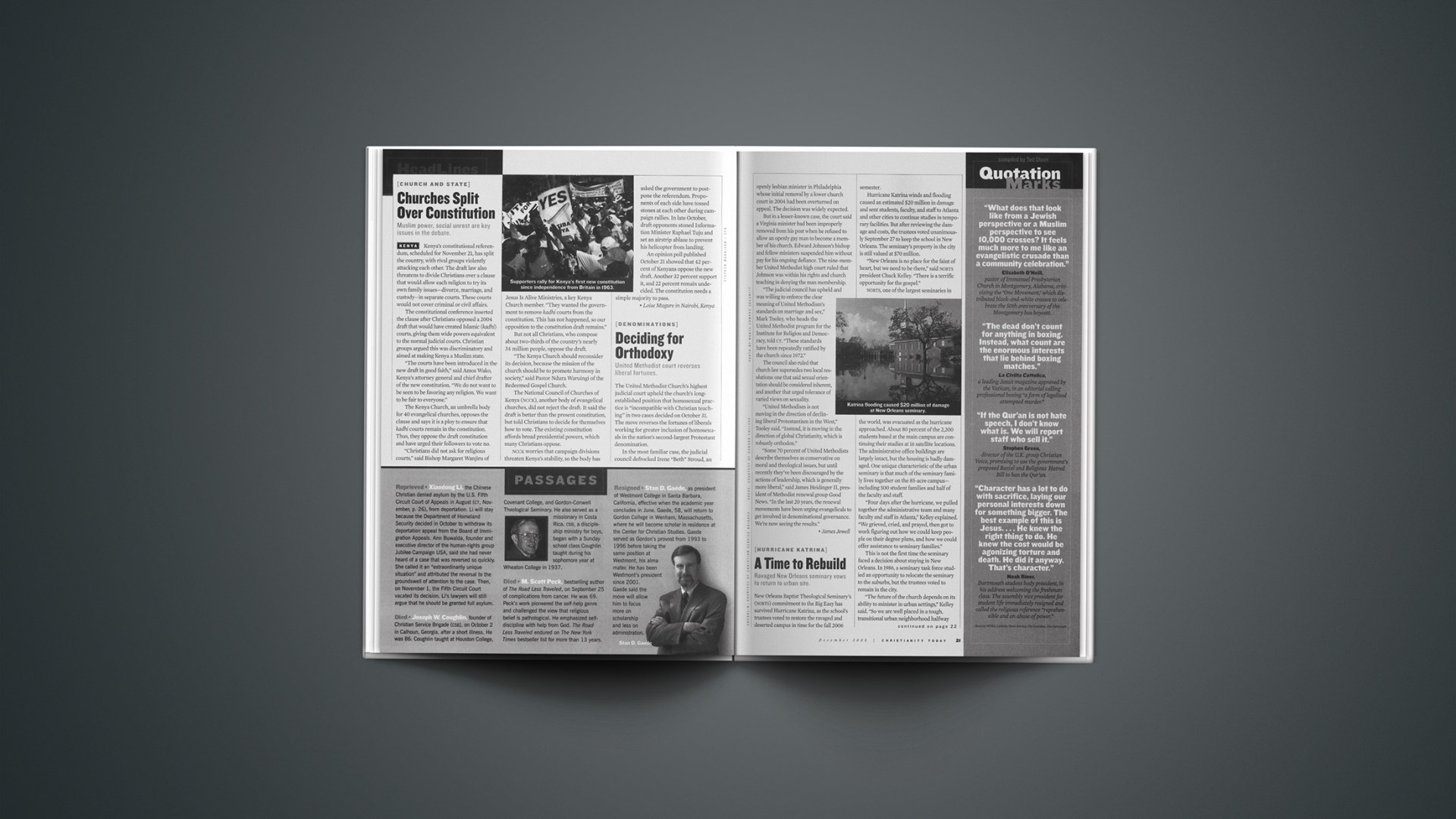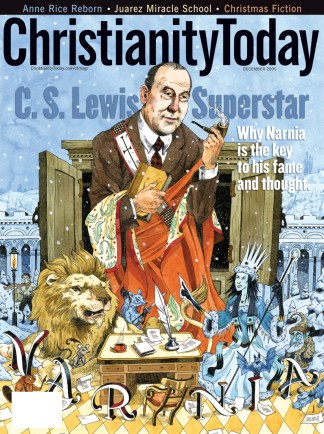| • |
Kenya’s constitutional referendum, scheduled for November 21, has split the country, with rival groups violently attacking each other. The draft law also threatens to divide Christians over a clause that would allow each religion to try its own family issues—divorce, marriage, and custody—in separate courts. These courts would not cover criminal or civil affairs.
The constitutional conference inserted the clause after Christians opposed a 2004 draft that would have created Islamic (kadhi) courts, giving them wide powers equivalent to the normal judicial courts. Christian groups argued this was discriminatory and aimed at making Kenya a Muslim state.
“The courts have been introduced in the new draft in good faith,” said Amos Wako, Kenya’s attorney general and chief drafter of the new constitution. “We do not want to be seen to be favoring any religion. We want to be fair to everyone.”
The Kenya Church, an umbrella body for 40 evangelical churches, opposes the clause and says it is a ploy to ensure that kadhi courts remain in the constitution. Thus, they oppose the draft constitution and have urged their followers to vote no.
“Christians did not ask for religious courts,” said Bishop Margaret Wanjiru of Jesus Is Alive Ministries, a key Kenya Church member. “They wanted the government to remove kadhi courts from the constitution. This has not happened, so our opposition to the constitution draft remains.”
But not all Christians, who compose about two-thirds of the country’s nearly 34 million people, oppose the draft.
“The Kenya Church should reconsider its decision, because the mission of the church should be to promote harmony in society,” said Pastor Ndura Waruingi of the Redeemed Gospel Church.
The National Council of Churches of Kenya (NCCK), another body of evangelical churches, did not reject the draft. It said the draft is better than the present constitution, but told Christians to decide for themselves how to vote. The existing constitution affords broad presidential powers, which many Christians oppose.
NCCK worries that campaign divisions threaten Kenya’s stability, so the body has asked the government to postpone the referendum. Proponents of each side have tossed stones at each other during campaign rallies. In late October, draft opponents stoned Information Minister Raphael Tuju and set an airstrip ablaze to prevent his helicopter from landing.
An opinion poll published October 21 showed that 42 percent of Kenyans oppose the new draft. Another 32 percent support it, and 22 percent remain undecided. The constitution needs a simple majority to pass.
Copyright © 2005 Christianity Today. Click for reprint information.
Related Elsewhere:
Articles elsewhere on Kenya’s constitution debate includes:
Kenyan ministers may face treason charges | Two Kenyan Cabinet ministers may be charged with treason for remarks suggesting the East African nation risks a coup if a proposed new Constitution is approved by voters, a senior government official said on Tuesday. (Mail & Guardian, South Africa, Nov. 1, 2005)
Dozens wounded in Kenya constitution riot | Dozens of people were wounded, one of them seriously, in clashes between rival factions in the increasingly bitter campaign for next month’s referendum on Kenya’s draft constitution, police and witnesses said. (AFX, Oct 27, 2005)
Proposed constitution for Kenya fuels rancor | President Mwai Kibaki came to power lauded as a model for how reformists can defeat Africa’s corrupt dictators. Three years later, his critics are calling on Kenyans to curb what they see as Kibaki’s own authoritarian tendencies by saying “No” to a proposed constitution that has sparked bitter and sometimes violent debate. (Associated Press, October 21, 2005)
Poll shows Kenyans rejecting new constitution | Kenyans look set to reject a new constitution in a referendum that has deepened divisions in President Mwai Kibaki’s ruling coalition and sparked violence in east Africa’s most developed nation, a poll showed on Friday. (Reuters, Oct 21, 2005)
The best site for monitoring Kenya’s constitutional dispute is AllAfrica.com, which has areas on Kenya and religion.
More articles from Kenya include:
Killer Taxes | Missionaries face a choice: Pay up or get out of Kenya. (March 7, 2005)
Mixing Religion and Politics | Churches attempt to overcome constitutional stalemate (March 18, 2004)
Courting Trouble | Christians oppose embedding Islamic tribunals in Kenya’s new constitution. (July 22, 2003)
Churches Back Truth Commission | Panel will examine allegations of murder and corruption under former president. (March 18, 2003)
Churches Celebrate Kenya’s New President | They are pushing for health care, free education, and an improved economy. (Feb. 20, 2003)
U.S. Blacks Preach Abstinence Gospel | Mission workers testify that Christ helps control sexual urges. (March 27, 2002)
Christians Flee Rioting | Tensions between landowners and tenants spark violence in Nairobi slum. (Jan. 31, 2002)










